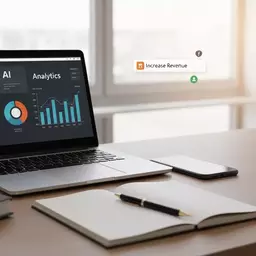Sales Funnel Strategies with AI

Are you ready to transform your sales strategy and boost your revenue? Understanding the sales funnel is the key, and integrating AI into this process can revolutionize your approach. Let's delve into the essential insights you'll gain from this article.
What You Will Learn
- The sales funnel stages include awareness, interest, consideration, evaluation, and purchase, each requiring tailored strategies.
- AI can enhance lead generation by utilizing predictive analytics and targeted advertising to identify potential customers.
- Personalization techniques driven by AI keep leads engaged, improving their journey through the funnel.
- Understanding the funnel allows for better resource allocation, maximizing ROI and reducing wasted effort.
- AI chatbots provide 24/7 support, ensuring leads receive timely assistance during the evaluation stage.
- Utilizing AI for sales forecasting and pipeline management optimizes processes and enhances revenue potential.
AI's Impact on the Sales Funnel Stages: A Transformation Overview
This visual illustrates how Artificial Intelligence (AI) revolutionizes each stage of the sales funnel, from initial awareness to final purchase, enhancing efficiency and effectiveness.
Awareness: AI for Lead Generation
- ‣Predictive Analytics
- ‣Targeted Advertising
- ‣Content Recommendations
Interest: Personalized Messaging
- ‣Behavioral Triggers
- ‣Tailored Content Delivery
Consideration: AI Lead Scoring
- ‣Scoring Models (Interactions, Likelihood)
- ‣Dynamic Adjustments in Real-Time
Evaluation: Chatbot Automation
- ‣24/7 Availability for Queries
- ‣Instant Information & Support
Purchase: Forecasting & Management
- ‣AI-driven Sales Forecasting
- ‣Efficient Pipeline Management
CRM Integration: Enhanced Efficiency
- ‣Data Integration for Insights
- ‣Automated Follow-Ups
Understanding the Sales Funnel: A Pathway to Revenue Growth with AI
In today's competitive landscape, understanding the sales funnel is crucial for driving revenue growth. The sales funnel represents the journey potential customers take from awareness to purchase. Grasping its stages—awareness, interest, consideration, evaluation, and purchase—enables businesses to tailor their strategies effectively. By mastering this funnel, you can optimize your marketing efforts, ensuring that you capture leads at every stage, ultimately enhancing profitability.
The sales funnel is not just a theoretical concept; it’s a roadmap that guides your business decisions. Each stage requires a unique approach to nurture leads and move them along the buying journey. Fostering a deep understanding of this process can set your business apart, leading to higher conversion rates and improved customer engagement. For further insights into the strategic application of AI in sales, a study highlights how AI is shaping the future of sales strategies, emphasizing its transformative impact.

The Importance of Navigating the Sales Funnel
Why is it vital for businesses to navigate the sales funnel? Here are a few key reasons:
- Identifying Opportunities: The sales funnel helps identify where leads drop off, allowing you to address potential issues.
- Targeted Marketing: By knowing which stage your leads are in, you can personalize marketing messages and outreach efforts.
- Resource Allocation: Understanding the funnel allows for better allocation of resources, ensuring that your efforts yield the greatest return on investment.
By actively managing these stages, businesses can reduce wasted effort and maximize their conversion rates. It's like having a map that points out where to focus your energy for the best results!
How AI Transforms Sales Funnel Stages
Integrating AI into your sales funnel can revolutionize the way you operate at each stage. AI technologies provide insights and automation that enhance efficiency and effectiveness. Let’s take a quick look at how AI transforms these stages:
- Awareness: AI tools analyze data to identify potential leads, enhancing your visibility in the market.
- Interest: Personalization techniques powered by AI keep prospects engaged and intrigued.
- Consideration: AI-driven lead scoring helps prioritize which leads to focus on based on their behavior and likelihood to convert.
- Evaluation: Chatbots offer immediate responses to queries, making the evaluation process seamless.
- Purchase: AI assists in sales forecasting, allowing businesses to manage their pipelines more effectively.
Incorporating AI provides a clear roadmap from leads to revenue, ensuring that businesses not only attract but also retain customers. It's exciting to think about how technology can simplify our processes, isn’t it?
AI-Driven Strategies for Each Stage of the Sales Funnel
Boosting Awareness: Leveraging AI for Lead Generation
To effectively generate leads, AI can play a pivotal role by employing various tools and techniques. Here’s how:
- Predictive Analytics: Use data to forecast customer behavior and identify potential leads.
- Targeted Advertising: AI enhances ad targeting by analyzing user demographics and preferences.
- Content Recommendations: AI can suggest content that resonates with your audience, driving more traffic.
Utilizing these tools allows businesses to focus their efforts on the right audience, making lead generation both efficient and effective. At My AI Business Coach, we've seen firsthand how these strategies can elevate marketing efforts! Furthermore, a comprehensive overview on AI-powered marketing and sales highlights how generative AI is reaching new heights, showcasing its potential to revolutionize lead generation.
Engaging Interest: Personalized Messaging through AI Insights
Engaging potential customers is crucial in the sales funnel's second stage. AI personalization techniques can be a game-changer:
- Behavioral Triggers: AI analyzes user actions to send timely and relevant messages.
- Tailored Content: Create custom content based on user preferences, enhancing their experience.
Using AI insights enables businesses to effectively capture interest and keep leads engaged throughout their journey. It’s all about meeting customers where they are, right?

Guiding Consideration: AI-Powered Lead Scoring Techniques
During the consideration phase, it's essential to prioritize leads effectively. AI-powered lead scoring can enhance this process:
- Scoring Models: AI algorithms evaluate leads based on interactions and likelihood to convert.
- Dynamic Adjustments: Lead scores can be updated in real-time as new data comes in.
This intelligent approach allows businesses to focus on high-potential leads, increasing the chances of conversion. It's amazing how AI can refine our decision-making processes!
Facilitating Evaluation: Chatbot Automation for Real-Time Interaction
As potential customers evaluate their options, having immediate support is key. AI chatbots can offer:
- 24/7 Availability: Customers can get answers to their questions any time of day.
- Instant Responses: Providing immediate information keeps leads engaged and informed.
By incorporating chatbots into the evaluation stage, businesses can ensure that no lead is left waiting, thus enhancing overall customer satisfaction. The ease of communication can make a significant difference!
Driving Purchase: Sales Forecasting and Pipeline Management with AI
Finally, as leads move toward purchase, AI tools can provide invaluable assistance:
- Sales Forecasting: AI analyzes historical data to predict future sales trends.
- Pipeline Management: Tools help track opportunities and manage deals effectively, ensuring nothing slips through the cracks.
This strategic use of AI not only streamlines the sales process but also helps in maximizing revenue potential. Embracing these technologies can truly elevate your business! For additional research on this topic, a study on AI in the sales funnel provides further context on the benefits of AI integration.
The Role of CRM in Enhancing Sales Funnel Efficiency
Integrating AI with Customer Relationship Management (CRM) systems can significantly optimize the sales process:
- Data Integration: AI enhances CRM systems by analyzing data and providing actionable insights.
- Automated Follow-Ups: AI can schedule follow-ups based on lead engagement, ensuring timely communication.
By leveraging AI within your CRM, you can create a more efficient and effective sales funnel, ultimately leading to increased profitability. It's a powerful combination that can transform how we manage our customer relationships!
Frequently Asked Questions About AI and the Sales Funnel
Interactive Poll: Your Sales Funnel Insights
As you consider how AI can transform your sales funnel, we want to hear from you! Which stage of the sales funnel do you think presents the biggest challenge for your business?
Summarizing the AI Growth Pathway in Sales
Integrating AI into each stage of the sales funnel is not just a trend; it’s a transformational journey that can significantly enhance your business's revenue growth. As we’ve explored, AI holds the potential to streamline lead generation, personalize engagement, and refine the entire sales process. By embracing AI, businesses like yours can not only improve efficiency but also create deeper connections with customers.
The benefits of incorporating AI are substantial. From boosting customer interactions to making data-driven decisions, the advantages are clear. As your business adapts to these new technologies, the pathway to revenue growth becomes not only clearer but also more achievable.
Next Steps for Implementing AI in Your Sales Funnel
Ready to harness the power of AI? Here are some actionable steps to get you started:
- Identify key areas in your sales funnel that could benefit from AI solutions.
- Research and choose appropriate AI tools tailored to your business needs.
- Train your team on how to effectively use these tools for maximum impact.
- Launch pilot projects to test AI applications and gather insights.
- Continuously measure and refine your strategies based on performance data.
These steps will set the foundation for a successful AI implementation. Remember, the goal is to enhance your sales processes while maintaining a personal touch with your customers. Your journey begins with these simple yet impactful actions!
Encouraging Continuous Improvement and Learning
In the fast-paced world of AI, continuous improvement is crucial. To stay competitive, businesses must regularly assess and adapt their AI strategies. This means not only keeping up with technological advancements but also staying attuned to customer feedback and market trends.
Consider implementing regular training sessions and workshops for your team to share new insights and best practices. This ongoing learning will encourage innovation and keep your sales funnel responsive to changes in customer behavior and preferences.
Measuring Success: Key Sales Metrics to Track Post-Implementation
To understand the effectiveness of your AI initiatives, tracking performance metrics is essential. Here are some key metrics to keep an eye on:
- Conversion Rate: Monitor how many leads turn into paying customers.
- Customer Acquisition Cost (CAC): Assess the cost-effectiveness of your lead generation efforts.
- Sales Cycle Length: Track the time it takes to close deals.
- Customer Lifetime Value (CLV): Measure the total revenue expected from a customer over their relationship with your business.
- Engagement Metrics: Evaluate customer interaction levels, such as open rates and response times.
By focusing on these metrics, you can gauge the success of your AI implementation and make data-driven adjustments as needed. Remember, the journey with AI is ongoing, and with each iteration, you can refine your approach for even greater success!
Recap of Key Points
Here is a quick recap of the important points discussed in the article:
- Understand the stages of the sales funnel: awareness, interest, consideration, evaluation, and purchase to effectively tailor your marketing strategies.
- Utilize AI to enhance each stage of the sales funnel, from identifying leads to improving customer engagement through personalized messaging.
- Implement AI-driven tools like predictive analytics, chatbots, and lead scoring to streamline operations and improve conversion rates.
- Continuously measure key sales metrics, such as conversion rates and customer acquisition costs, to assess the effectiveness of your strategies.
- Encourage ongoing learning and adaptation of AI technologies to stay competitive and responsive to market changes.
Popular Posts
 Have you ever wondered how artificial intelligence can reshape consumer behavior and decision-making
Have you ever wondered how artificial intelligence can reshape consumer behavior and decision-making
 As the digital landscape evolves, small businesses are discovering that artificial intelligence is n
As the digital landscape evolves, small businesses are discovering that artificial intelligence is n
 Did you know that personalized marketing can lead to a revenue increase of up to 30%? In an era wher
Did you know that personalized marketing can lead to a revenue increase of up to 30%? In an era wher
 Are you aware that reactivating dormant customers can significantly enhance your business growth? Ma
Are you aware that reactivating dormant customers can significantly enhance your business growth? Ma
